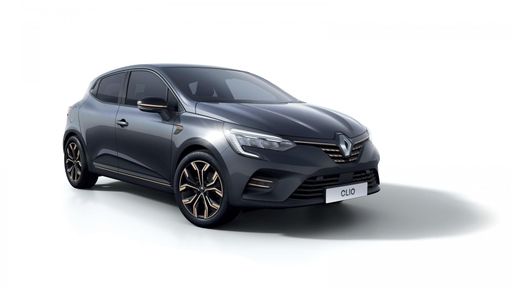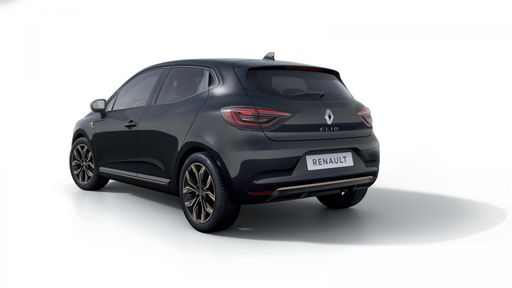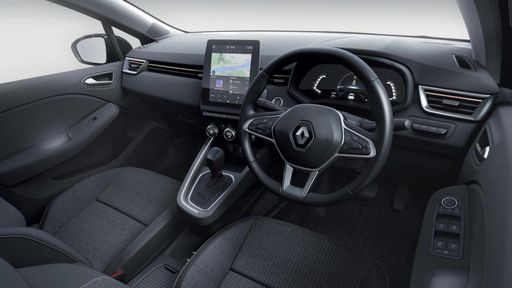Renault Clio VS Hyundai Bayon – Specs, Efficiency & Price Comparison
Which model is the better choice – the Renault Clio or the Hyundai Bayon? We compare performance (143 HP vs 100 HP), boot capacity (391 L vs 411 L), efficiency (4.30 L vs 5.40 L), and of course, the price (16600 £ vs 20100 £).
Find out now which car fits your needs better!
The Renault Clio (Hatchback) is powered by a Full Hybrid, Petrol or LPG engine and comes with a Automatic or Manuel transmission. In comparison, the Hyundai Bayon (SUV) features a Petrol engine and a Manuel or Automatic gearbox.
When it comes to boot capacity, the Renault Clio offers 391 L, while the Hyundai Bayon provides 411 L – depending on what matters most to you. If you’re looking for more power, you’ll need to decide whether the 143 HP of the Renault Clio or the 100 HP of the Hyundai Bayon suits your needs better.
There are also differences in efficiency: 4.30 L vs 5.40 L. In terms of price, the Renault Clio starts at 16600 £, while the Hyundai Bayon is available from 20100 £.
Compare all the key specs now and find out which model fits your lifestyle best!
Renault Clio
The Renault Clio continues to impress with its sleek design and agile handling, making it a standout choice in the compact car segment. Inside, it offers a surprisingly spacious and comfortable cabin, crafted with high-quality materials that enhance the driving experience. Its fuel efficiency and reliable performance make it an attractive option for both city commuting and longer journeys.
details @ renault-presse.de
@ renault-presse.de
 @ renault-presse.de
@ renault-presse.de
 @ renault-presse.de
@ renault-presse.de
Hyundai Bayon
The Hyundai Bayon is a compact crossover that effortlessly merges practicality with modern design. Its sleek exterior and spacious interior make it an ideal choice for urban settings and longer journeys alike. With a focus on comfort and connectivity, this vehicle provides a smooth driving experience paired with advanced technology features.
details @ hyundai.news
@ hyundai.news
 @ hyundai.news
@ hyundai.news
 @ hyundai.news
@ hyundai.news
 @ hyundai.news
@ hyundai.news
 @ hyundai.news
@ hyundai.news

|

|
|
|
|
Costs and Consumption |
|
|---|---|
|
Price
16600 - 23000 £
|
Price
20100 - 25800 £
|
|
Consumption L/100km
4.3 - 7 L
|
Consumption L/100km
5.4 - 5.5 L
|
|
Consumption kWh/100km
-
|
Consumption kWh/100km
-
|
|
Electric Range
-
|
Electric Range
-
|
|
Battery Capacity
0.60 kWh
|
Battery Capacity
-
|
|
co2
97 - 122 g/km
|
co2
124 g/km
|
|
Fuel tank capacity
32 - 42 L
|
Fuel tank capacity
40 L
|
Dimensions and Body |
|
|---|---|
|
Body Type
Hatchback
|
Body Type
SUV
|
|
Seats
5
|
Seats
5
|
|
Doors
5
|
Doors
5
|
|
Curb weight
1124 - 1331 kg
|
Curb weight
1170 - 1195 kg
|
|
Trunk capacity
301 - 391 L
|
Trunk capacity
411 L
|
|
Length
4053 mm
|
Length
4180 mm
|
|
Width
1798 mm
|
Width
1775 mm
|
|
Height
1440 mm
|
Height
1500 mm
|
|
Payload
398 - 406 kg
|
Payload
460 - 465 kg
|
Engine and Performance |
|
|---|---|
|
Engine Type
Full Hybrid, Petrol, LPG
|
Engine Type
Petrol
|
|
Transmission
Automatic, Manuel
|
Transmission
Manuel, Automatic
|
|
Transmission Detail
Automatikgetriebe, Schaltgetriebe
|
Transmission Detail
Schaltgetriebe, Automat. Schaltgetriebe (Doppelkupplung)
|
|
Drive Type
Front-Wheel Drive
|
Drive Type
Front-Wheel Drive
|
|
Power HP
67 - 143 HP
|
Power HP
100 HP
|
|
Acceleration 0-100km/h
9.3 - 17.1 s
|
Acceleration 0-100km/h
11.3 - 12.4 s
|
|
Max Speed
160 - 174 km/h
|
Max Speed
176 - 179 km/h
|
|
Torque
95 - 205 Nm
|
Torque
172 - 200 Nm
|
|
Number of Cylinders
3 - 4
|
Number of Cylinders
3
|
|
Power kW
49 - 105 kW
|
Power kW
74 kW
|
|
Engine capacity
999 - 1598 cm3
|
Engine capacity
998 cm3
|
General |
|
|---|---|
|
Model Year
2023 - 2024
|
Model Year
2024
|
|
CO2 Efficiency Class
C, D
|
CO2 Efficiency Class
D
|
|
Brand
Renault
|
Brand
Hyundai
|
Renault Clio
Introduction to the Renault Clio
The Renault Clio, a popular choice among compact cars, has continually advanced its design and technology to maintain a strong position in the automotive market. With enhancements in engineering, efficiency, and aesthetic appeal, the Clio remains a top contender in the hatchback category.
Advanced Hybrid Technology
The Renault Clio's hybrid technology is one of its standout features. The E-Tech Hybrid system optimises both performance and efficiency, offering a seamless transition between electric and fuel-powered driving. This setup results in an impressive fuel consumption rate of 4.3 L/100km, making it an attractive option for eco-conscious drivers.
Efficient Engine Options
Renault offers a variety of engine choices for the Clio, accommodating different driving styles and preferences. From the economical SCe 65 manual variant to the powerful TCe 100 LPG gas version, each option is engineered to balance performance with fuel efficiency. With outputs ranging from 67 to 143 PS, drivers can enjoy a tailored driving experience.
Design and Comfort
The Renault Clio stands out with its sleek and modern design, characterized by its hatchback body style. The interior boasts an ergonomic layout with seating for five, ensuring passenger comfort and convenience. With a boot capacity of 301 to 391 litres, the Clio also offers practical storage solutions for everyday use.
Safety and Innovation
Safety is a key priority for Renault, and the Clio reflects this commitment with its suite of innovative safety features. Advanced driver-assistance systems are integrated throughout, enhancing both safety and usability. The Clio encompasses features like lane departure warning, automatic emergency braking, and adaptive cruise control.
Cost Efficiency and Environmental Impact
The Renault Clio not only offers affordability with pricing ranging from €18,450 to €26,800, but also promises low running costs. With CO2 emissions between 97 and 130 g/km, the Clio fits well within the C and D efficiency classes. This makes it a cost-effective and environmentally friendly choice for modern drivers.
Conclusion
Renault Clio remains a dynamic, dependable and economical option in the compact car segment. With its innovative technologies, diverse engine options, and commitment to safety and design, the Clio continues to impress and adapt to the evolving demands of the automotive world.
Hyundai Bayon
Introducing the Hyundai Bayon: A New Era in Compact SUVs
The Hyundai Bayon, a compact SUV designed with urban adventurers in mind, is making waves with its exceptional blend of style, performance, and technology. The brand has pulled out all the stops to ensure that the Bayon stands out in the crowded SUV market, offering a vehicle that is both practical and innovative.
Sleek Design and Cutting-Edge Aerodynamics
The Bayon features a striking exterior design, characterised by its bold lines and angular shapes. With a length of 4180 mm, a width of 1775 mm, and a height of 1500 mm, the Bayon commands attention with its modern appeal and aerodynamic efficiency. These dimensions not only contribute to its sleek design but also enhance fuel efficiency, achieving an impressive 5.4 L/100 km.
Engine Performance and Specifications
Under the bonnet, the Bayon is powered by a 1.0-litre T-GDI petrol engine, delivering a robust 100 PS or 74 kW. This engine is available with either a manual or automatic gearbox, meeting varied driver preferences. The front-wheel-drive system complements its urban-centric design, ensuring a smooth and responsive ride.
Maximised Interior Space and Comfort
The spacious interior of the Bayon accommodates up to five passengers comfortably. The vehicle boasts a boot space of 411 litres, perfect for both everyday use and weekend getaways. The cabin is designed with practicality and technology in mind, with intuitive controls and ample storage options.
Advanced Technology and Connectivity
Hyundai has equipped the Bayon with state-of-the-art technology to enhance the driving experience. The SUV features a high-resolution touchscreen, offering seamless connectivity with Apple CarPlay and Android Auto. Safety is also a priority, with multiple driver assistance systems including lane-keeping assist and forward collision avoidance assist.
Environmental Efficiency
Despite its powerful performance, the Bayon achieves a respectable CO2 efficiency class of D, with emissions as low as 122 g/km. This balance between performance and environmental responsibility makes the Bayon an attractive option for conscientious drivers.
Affordability and Market Appeal
The Hyundai Bayon is competitively priced, ranging from €22,900 to €29,600. Its affordable running costs, estimated at 32.3 to 36.4 cents per kilometre, further enhance its appeal to budget-conscious consumers. With monthly costs ranging from €806 to €909, the Bayon provides excellent value without compromising on features or performance.
Final Thoughts
The Hyundai Bayon truly stands out in the compact SUV segment, combining style, innovation, and practicality in an appealing package. It offers a versatile driving experience suited to the demands of modern urban living, making it a top contender in its class. As Hyundai continues to champion forward-thinking design and technology, the Bayon is a testament to the company's ongoing commitment to excellence.
The prices and data displayed are estimates based on German list prices and may vary by country. This information is not legally binding.
